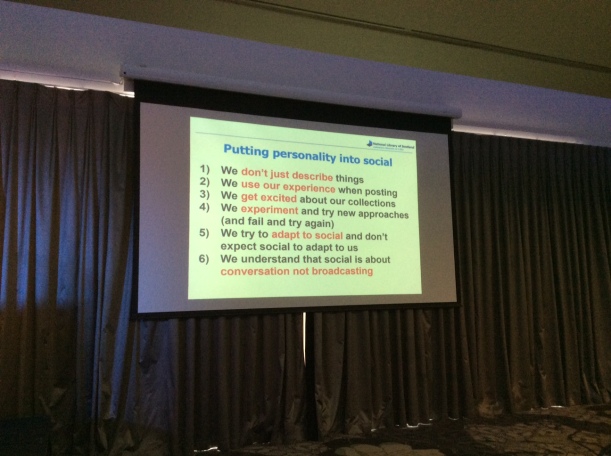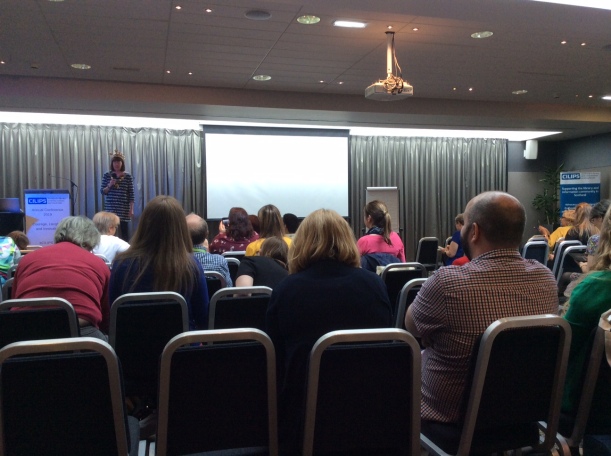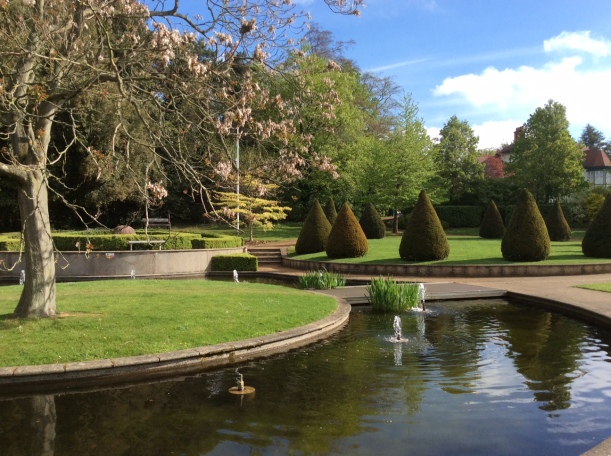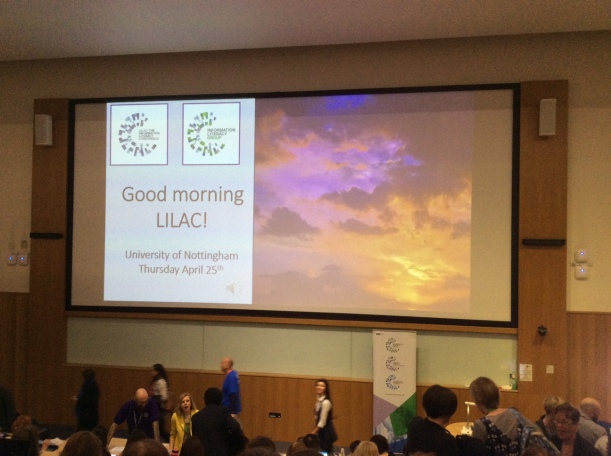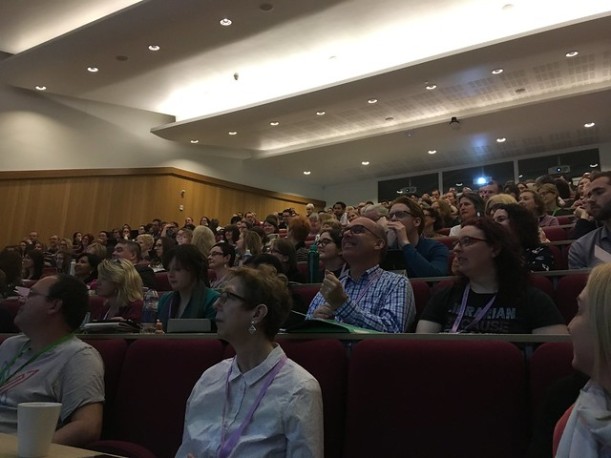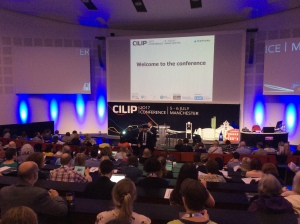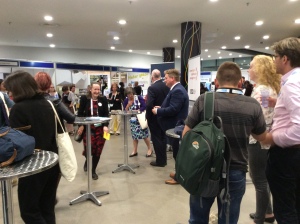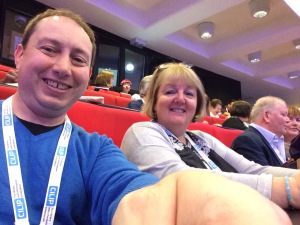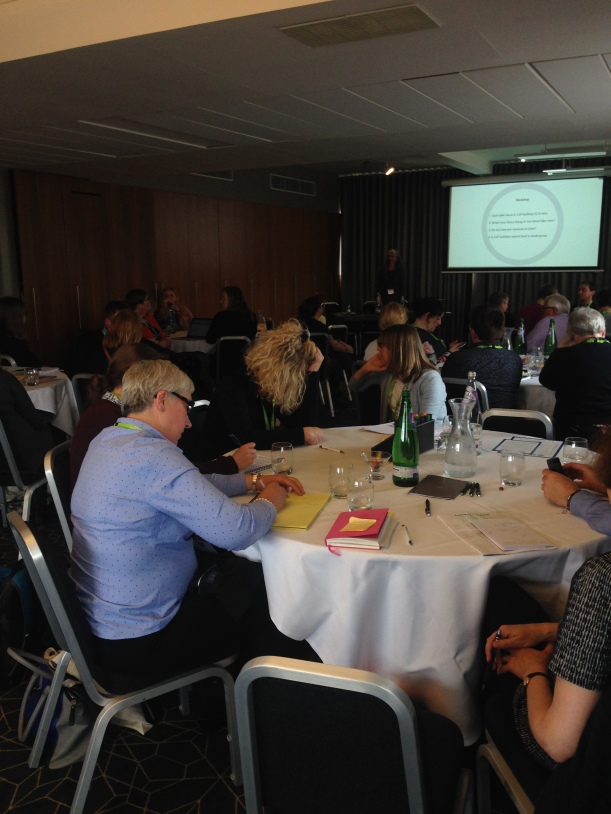Paul Gray and Fiona Palmar attended the 2018 CILIPS Autumn Gathering. Here are our reports from the day:
Paul Gray
It’s been 2 years since I last attended the CILIPS Autumn Gathering, so I was looking forward to dipping into this sample of the wide range of matters Scottish libraries are currently involved with, outlined in the programme. CILIPS has also uploaded the presentations from the conference and delegates were busy on Twitter providing a sense of what the hot topics were. Here are my key points from the day:
Poverty in Scotland 2018: trends, causes and potential solutions – Dr. Jim McCormick, Associate Director Scotland, Joseph Rowntree Foundation
This opening keynote gave a sobering update on poverty in Scotland. 1 in 5 Scots are living in poverty. But with very few couples in Scotland both not working, low paid insecure work is now the leading cause of poverty. JRF see the problem lies mainly with the job market – plus reduced tax credits and delays in universal credit payments. JRF has a vision of no one being in poverty for more than 2 years by 2030 and advocates springboards rather than safety nets for those in poverty.
Engaging Libraries and Science – East Dunbartonshire’s Intergenerational Brainworks Project. Lesley Tyler, Children and Families Coordinator, East Dunbartonshire Leisure and Culture Trust
Lesley described the many and varied sessions the Brainworks Projects runs with children and older adults to help understand on how the human brain works. However, Lesley happened to mention Second Life (a 3D social virtual world). I explored Second Life a few years ago when I was interested in its potential as a learning environment. Having felt it hadn’t really taken off it was interesting to hear about Dr Evelyn McElhinney’s thesis on the health literacy skills and practices undertaken by people who have accessed health information in Second Life, and the influence on their physical world health behaviour. Apparently most Second Life users are now over 40 with younger ‘griefers’ having left the site. I do recall this being a barrier to people taking Second Life seriously a few years ago.
My journey to professional recognition – Sally Walker, Orkney Libraries and Scotland’s Library and Information Professional 2017
I recall voting for Sally for “Scotland’s Library and Information Professional 2017” on the variety of initiatives she started in Orkney libraries children’s services. So in this second keynote of the day it was great to hear how winning that title had boosted her career – where she continues to innovate and develop Orkney libraries children’s services. Including acquiring microbits going out to schools teaching pupils how to programme them. And clubs for Lego, Minecraft and coding.
Information Literacy: A new definition and the role of library and information professionals. Jacqueline Geekie, Information Literacy and Learning Librarian for Aberdeenshire Libraries
“Information literacy is the ability to think critically and make balanced judgements about any information we find and use. It empowers us as citizens to reach and express informed views and to engage fully with society.”
This is the new definition launched at LILAC in April 2018. Jacqueline explained this is based on member survey feedback in 2016 and LILAC feedback in 2017, and it replaces the previous definition from 2004.
The CILIP Information Literacy Group website also includes details on the role of information literacy across a range of sectors including health.
Social media literacy and the new challenges to online debate – Dr. Jennifer Jones
This was the most relevant and significant session for me. Jennifer compared the new and optimistic social media landscape 10 years ago with how that has actually panned out 10 years on. From the expectation that organisations need to “digitally transform” to fake news and misinformation. Plus the rapid growth of user generated content. To get a measure of this boom in content Jennifer explained 90% of all online data has been produced in the last 2 years.
To help manage these issues around social media literacy in 2018 Jennifer gave a taster of her 9 challenges for online discourse.
Health Information Pathways – the collaborative approach across public libraries, NHS and third sector, to support public library staff to develop their role in self-management, health literacy and shared decision-making. Marianne Brennan, Development Officer, The Health and Social Care Alliance Scotland
This session outlined that Ambition & Opportunity (the National Strategy for Scottish Public Libraries) is being updated – with Health Information Pathways focussing on strategic aim 4 (social wellbeing).
Marianne also discussed how The Alliance recognises that libraries help people’s wellbeing and has created a SLIC funded supporting self management toolkit as well as running a 2 year pilot to bring librarians into the multi-professional health care team.
Ethics and the role of the PKSB (Professional Knowledge and Skills Base) in research. Paul Cannon, College Librarian Medical, Veterinary & Life Sciences, University of Glasgow Library
Paul described his research journey through his professional doctorate and drew a comparison stating the things required from librarians’ professionalism are similar to those of those in medical professions. Though he has found the demands of employer often come before those as professional librarian.
Paul uses 3 frameworks to counter ethical challenges:
However, PKSB frameworks can’t always be nuanced enough to be appropriate for all parts of the information profession. Paul also highlighted the lack of high quality research about the Library profession. CILIP is looking at an evidence based practice profession, and has organised webinars around research skills and has a Library and Information Research group. But these efforts aren’t joined up and the impact not known.
Libraries and Kinder Communities – Zoe Ferguson, The Carnegie UK Trust
In the final keynote Zoe discussed why kindness in communities is important. Kindness in delivering public services is something I’ve read quite a lot about lately, and this talk explained that it’s not about asking people to be kinder to each other. Rather, it’s what are the factors that help create kindness? Such as welcoming places, informal opportunities and the values of kindness. Though our attitudes to risk, regulation, professionalism and performance management can get in the way. For example, are libraries being pressured into contributing outcomes rather than being a welcoming community place?
Zoe concluded by stating kindness should be a key indicator when looking at performance measure rather than the more traditional measures.
Paul Gray
December 17, 2018

CILIPS Autumn Gathering 2018
Fiona Palmar
At only my second CILIP event ever, as well as thoroughly enjoying the networking opportunities and the exhibition I took a dip into some of the seminars to complement my own Governmental sector knowledge.
Memorabilia and Ephemera: Football programmes at the National Library of Scotland – Graeme Forbes, Associate Director of Collections Management
In an insightful seminar Graeme described the role of Football programmes in particular, and the larger collection of ephemera within the National Library of Scotland, in general as an insight into various aspects of Scottish social history.
Various aspects of the programmes were discussed:
- The history of each club that has provided material for the collection
- The rise of advertising, with adverts placed by local and national companies
- Captions for photographs
- Evidence of printing and typing technologies
- Rule changes within the history of the game
- Pitch diagrams and references to individual team members playing in any individual match
Overall a fascinating insight into a little known collection in the NLS, but the bit that stood out for me was the difficulty in cataloguing such a collection, given such a diverse range of aspects that an individual searcher may be looking for (both for family and social history aspects).
Librarians with Lives – Jo Wood
A very personal insight into her career within Librarianship, which particularly covered the areas of Health and Resilience within the profession in general and with specific reference to her career path.
Particularly interesting to me, were the subtopics of Employer support, Support Strategies and Support Networks.
Jo’s last section covered the creation and development of her Podcast: Librarians with Lives. In particular how it developed and how it fits into her (and our) CPD with references to the Networking opportunities that it provides.
As a result of this seminar I have subscribed to her podcast, and have thoroughly enjoyed the episodes that I have heard so far. I am also involved in learning all I can about Resilience tools and techniques towards supporting Mental Health in the workplace.
Marketing academic libraries and understanding student needs – Dr Sonya Campbell-Perry. Head of Customer Service, The Library, Glasgow Caledonian University
Sonya covered a variety of interesting points relating to knowing how we as service providers, can know what service users actually want, and how providers can supply this need in an ever changing digital environment.
One question that resonated with me in particular, was the question: “How do you manage expectations?” This is particularly relevant because service providers in all sectors are encountering users that demand flexible , easy to use, seamless services, but don’t often get the funding to do this!
I also found of use the idea of spending time on customer journeys, of identifying the pain points and limiting or eliminating them entirely. I hope to put this into practice in my own work practices.
Voice and Vision: essential issues around diversity and inclusion for school libraries – Jake Hope – Voice and Vision Book
Jake identified lots of national and local drivers of diversity and introduced some concepts of diversity that we had not personally thought of. He divided the room and used little groups to identify drivers that were local to sectors, or individual situations.
Some of the areas that emerged included how to include information in collections for users requiring:
- Autism and Dyslexia friendly information delivery
- Visual and mental health accessibility
- Braille and Foreign language books
- Wheelchair accessible furniture
As well as the usual diversity factors of Age, Disability, Gender and Gender identity, Race, Religion/belief, Sexual orientation, Social class and educational needs.
A real eye opener.
Fiona Palmar
December 17, 2018
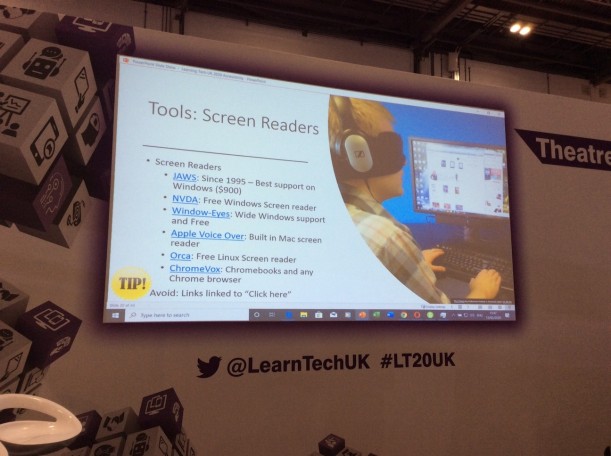 Paul Schneider from Dominknow: screen readers
Paul Schneider from Dominknow: screen readers Learning Technologies exhibition
Learning Technologies exhibition
